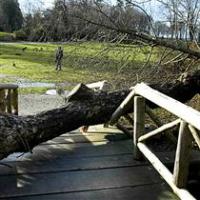Mark Twain once said, “Climate is what we expect; weather is what we get.”
But when you keep getting weather you weren’t expecting, at what point do you (or your government) begin changing expectations about climate?
The following idle catch-all is entirely anecdotal – it is, perhaps, just a series of climate coincidences – but you have to wonder how many of these “one-off” weather events must occur before the dwindling world community of climate change deniers acknowledges that something is amiss.
In the Nairobi meeting of the signatories to the 1997 Kyoto Protocol in November, officials warned that weather disasters caused by climate change could cost up to $1 trillion a year by 2040.
A windstorm, which also set new rainfall records, left 150,000 people without power in Seattle area Dec. 16, 2006, resulting in several deaths, in the failure of the 9-1-1 emergency system and in the closure of at least nine public health facilities. Adding Washington and Oregon states together, a total of 1.5 million people were without power at the height of the storm.
The same storm also ravaged Vancouver, knocking down 20 per cent of the trees in this city’s landmark Stanley Park (per the Canadian Press photo, left).
A record-breaking November rainstorm left 200,000 people in Vancouver and on Vancouver Island with no power and millions having to boil water after reservoirs were inundated with unprecedented runoff. In one location in Victoria, where University of Victoria climate modeler Andrew Weaver supports a public school weather monitoring project, students recorded half the annual average rainfall in a single day.
The same storm caused $30 million in flood damage in King County, Washington.
BC Hydro, the company that provides nearly all the electrical energy in British Columbia, announced that storm damage in this busy season is currently beyond the utility’s ability to estimate. “Normal” storm damage can hit $5 million, but British Columbians have endured three storms back to back, “and there is nothing normal about this storm event,” BC Hydro spokester Elisha Morena said on Dec. 19, 2006.
Serge Corbeil, spokesman for the Insurance Bureau of Canada, estimated that insurance claims from the three storms could be as high as $70 million or $80 million.
Insured weather losses in Canada between 1985 and 1995 totaled $1.7 billion; between 1995 and 2005, weather-related losses have totaled $6.7 billion, according to Sean Russell, the head of Swiss Re Canada’s underwriting unit.
At the same time, from B.C. to Alberta, average autumn temperatures are about six degrees above normal, raising fears on the prairies about spring droughts caused by lack of adequate winter snowfall
According to Environment Canada senior climatologist David Phillips, the probability of seeing a White Christmas in the 1960s was:
- Calgary: 73 per cent
- Charlottetown: 93 per cent
- Edmonton 100 per cent
- Toronto: 60 per cent
- Montreal: 80 per cent
But the chances have dropped across the board, and in the past decade the probabilities are:
- Calgary: 47 per cent
- Charlottetown: 67 per cent
- Edmonton: 73 per cent
- Toronto: 33 per cent
- Montreal: 67 per cent
And this year, they’re golfing in Toronto.
Subscribe to our newsletter
Stay up to date with DeSmog news and alerts






